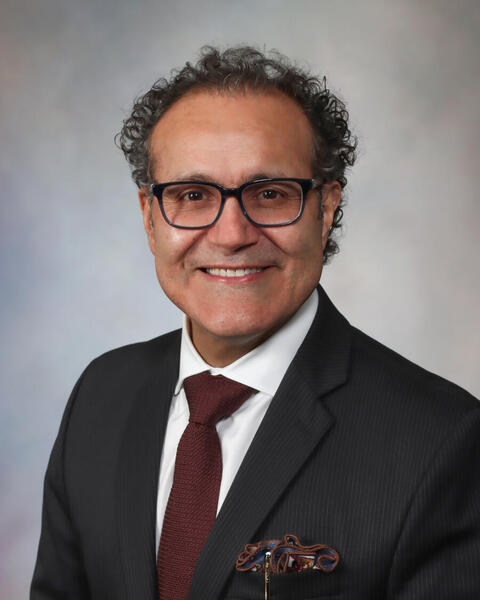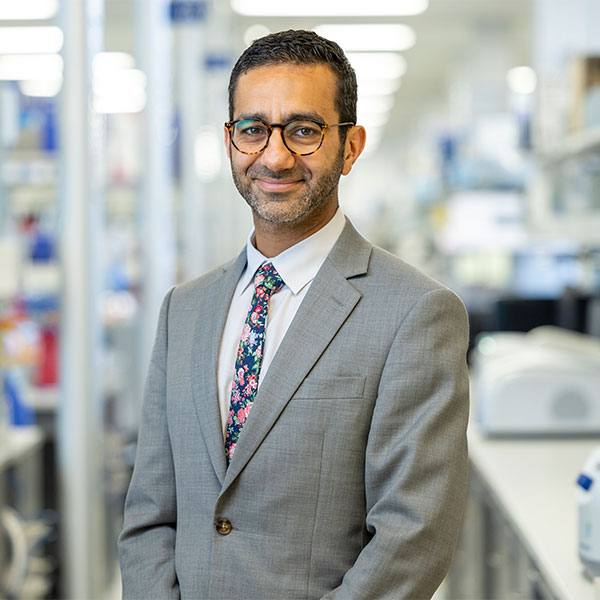-
Florida Research growth and advancements in 2022
Highlights of Research activities at Mayo Clinic in Florida were included in a Mayo Clinic government relations report to the State of Florida last month. Florida Research continues to grow at a rapid pace. New programs in cancer and biotherapeutics; additional space on campus; significant scientific discoveries in cancer and the neurosciences; and a new dean of Research highlighted 2022 research activities.

New dean of Research
Alfredo Quiñones-Hinojosa, M.D., was named dean of Research at Mayo Clinic in Florida on Nov. 1, 2022. Dr. Quiñones-Hinojosa succeeds Tushar Patel, M.B., Ch.B., who held the position since 2014.
Dr. Quiñones-Hinojosa is a consultant and chair of the Department of Neurosurgery. He has a primary appointment in neurologic surgery and joint appointments in otolaryngology-head and neck surgery, molecular neuroscience, cancer biology and anatomy. He holds the academic rank of professor of neurosurgery. He is the Monica Flynn Jacoby Chair, Neurologic Surgery; and holds the William J. and Charles H. Mayo Professorship. Dr. Quiñones-Hinojosa is the director of the Brain Tumor Stem Cell Research Laboratory and studies brain tumors from a surgical, imaging, clinical and basic science perspective.
Cancer research
The Mayo Clinic Comprehensive Cancer Center, comprising renowned physicians, researchers and scientists, provides team-based, patient-centered research to develop the latest technologies and treatments to address unmet patient needs. Among the center's objectives are increasing inclusion of Northeast Florida's underserved populations in clinical trials and increasing access and research participation. Patients have access to hundreds of clinical trials in all phases. There are nine research programs within Mayo Clinic Comprehensive Cancer Center.
Mayo is working on the transformation of cancer care delivery, with novel personalized therapeutics and vaccines currently under investigation in research studies; the conduct of clinical trials in the home and community settings; and patient-centered and patient-directed health care.
Preclinical studies are testing personalized therapeutic cancer vaccines to target an individual's distinctive tumor characteristics and boost the power of the immune system to identify and attack cancer cells. The approach relies on DNA and RNA sequencing, as well as bioinformatics. These vaccines target mutated proteins, called neoantigens, that occur only in the tumor. Keith Knutson, Ph.D., and Yan Asmann, Ph.D., are among the researchers studying neoantigen cancer therapy, part of Mayo Clinic's Neoantigen Personalized Vaccine Program.
Biotherapeutics and regenerative medicine
Mayo Clinic's Center for Regenerative Biotherapeutics is developing regenerative biotherapies in early stage clinical trials for rare and complex disease and is seeking industry collaborations to commercialize therapies for the benefit of patients around the world.
Mayo Clinic researchers are studying chimeric antigen receptor-T cell therapy (CAR-T cell therapy) to treat blood cancers, while also addressing its challenges. CAR-T cell therapy is a type of immunotherapy that reprograms a patient's T cells to recognize and destroy cancer cells. Hong Qin, M.D., Ph.D., director of Regenerative Immunotherapies at Mayo Clinic in Florida, is working to advance research into clinical trials for CART-T cell therapy using investigational new drugs.
A Mayo Clinic study of real-world evidence found that applying regenerative medicine to a common shoulder surgery could have an impact on the need for follow-up revision surgery in some patients. Mayo Clinic researchers analyzed the largest set of data available to determine if adding bone marrow aspirate concentrate to repaired tissue after standard rotator cuff surgery would improve outcomes for patients. Bone marrow aspirate is fluid taken from a patient's bone marrow that contains concentrated growth factors, stem cells and other specialized cells that may regenerate tissue and cartilage. The results of the study are published in the Orthopaedic Journal of Sports Medicine.
See the full 2022 Florida Research highlights, which also include significant research advancements in neuroscience, individualized medicine, and community engagement research.









